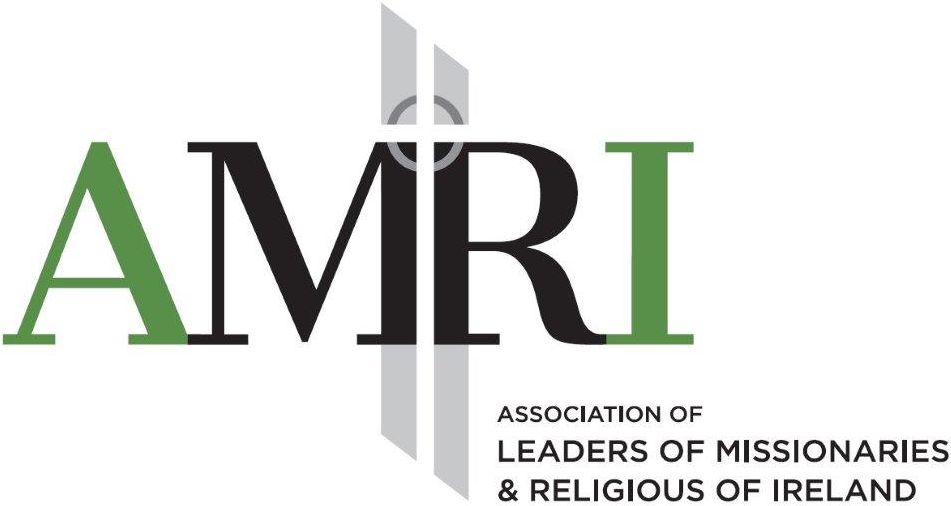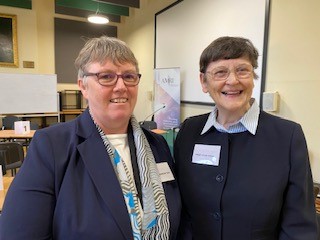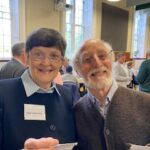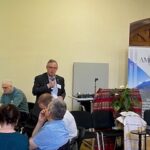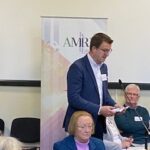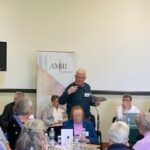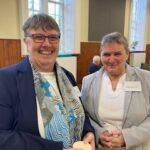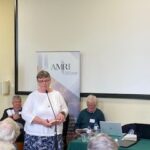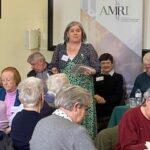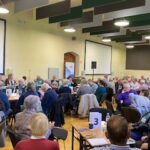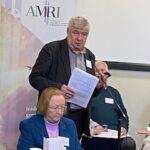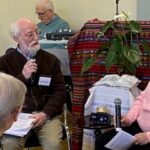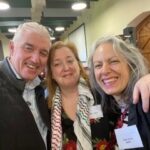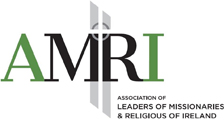Becoming A Synodal Church – Gerard Gallagher (Secretary General AMRI) Sr Anne Codd pbvm (Leadership and Support Development AMRI)
All Hallows 1 May 2024
Almost 100 delegates were present at All Hallows on Wednesday 1 May for ‘Becoming a Synodal Church’ hosted by AMRI in cooperation with the All Hallows Trust. Fr Tim Lehane SVD, as President of AMRI, welcomed everyone. He quoted one of the AMRI’s banner ‘Journeying together on the synodal pathway… seeking wisdom.’ Sr Anne Codd who co-ordinated the day for AMRI invited Sr Mary T Barron OLA to pray the Synodal Prayer in solidarity with our universal Church and our world. Sr Mary, as Congregational Leader, is President of UISG and a Synodal Participant. Later in the day she would remark that she is taking all the voices and echoes of the day in All Hallows to Rome when she will participate in the next phase of the Synodal Assembly in October 2024.
Throughout the day delegates were invited to follow a prayerful, dialogical, and reflective process. It was an ‘experiential’ day. There were no passive bystanders in the room. Everyone got an opportunity to listen, talk, reflect, and engage with the programme. There were a series of conversation-starters and opportunities to listen to panellists reflecting the conditions for Synodality, the ecological context and crisis, and the marginal peripheries.
Dr Eamon Conway, Theological Advisor to the Synodal process, spoke about the background to the current sessions of the Synod. He noted how participation at the Synodal Assembly in October 2023 was quite different from his previous experiences of Synods. This time lay people and religious, male and female, also had voting right. His experience this time, he recalled, was of profound mutual listening by all the people participating in the Synod Hall.
Eamonn noted the impressive moments of silence and prayer each day of the Assembly. He also spoke of the ‘conversion’ that may be experienced when we, as people of faith, speak and listen well.
Chapter 10 in the Synthesis Report speaks specifically of the importance of evolving and emerging charisms in the Church. Eamonn drew attention to synodality as bringing to life the vision of Lumen Gentium and the Second Vatican Council. He spoke about the Consecrated Life and its role within the life of the Church. Noting that by 2025 the majority of Catholics will be in the Global south, he invited us to take a global perspective on our faith. ‘We are in a change of ‘epoch.’ Synodality is not a plan B for the Church – it much more than that. It is a way of listening to the call to be there for the world with a much wider presence. ‘How are we to be Church in this new epoch?’ We are in moment of change not just decay. This time is a new appropriation of Vatican II.’ We are still living in a time of ‘ongoing revelation’ (Dei Verbum) How do we discern what God is asking of us at this time?
In response to questions concerning outreach to young people, Eamonn spoke about creating ‘sanctuary’ spaces – thin places where points of contact and conversation can take place, and the presence of the divine can be discerned.
Throughout the day Fr Gerry O Hanlon SJ provided valuable pointers to Theological Reflection, responding to each of the topics and themes as they arose. He reflected on the prophet being counter cultural – not just in the world but also within the Church. We need to discern this. He too spoke about Dei Verbum, ‘seeing faith as an encounter with a person not a series of propositions.’ We need to create ‘spaces of encounter.’ Justice is a constitutive dimension of the Gospel and is an essential aspect of Church life in mission if it is to be an ambassador of the good news.
Gerry referenced Pope Francis on ‘marrying discernment with diplomacy.’ He also noted we should not be afraid of conflict. ‘Stick with it.’ We must try to hold polarities and live with tension while we journey on. He spoke about the issue of women in the church and how it is still a major challenge, including to Pope Francis. It cannot be ‘off the table’ until the people are at peace and the theologians are united in their understanding. The point is that Pope Francis has initiated a synodal process – that is what he is open to – people speaking and listening to the common pain. We need to be open to encounters that can change us.
Particularly good group conversation time was spent exploring the ‘necessary conditions for synodal experience’ as well as the call to Church in our time to respond to the ‘cry of the universe’ and the reality of exclusion in all its manifestations. Testimonies and conversations evoked a sense of what it means to ‘be’ synodal, to act synodally at every level – community, church, local as well as universal, in all aspects of life as well as in pastoral outreach.
Of course, delegates too spoke to areas of concern including the basic equality of all in the community of the baptised, recognition of the role of women in the Church, ordination, and fuller participation and recognition of the role of Religious. Some tensions are important and need to be kept alive in open conversation. What must be said? What must be heard and what disturbs us?
Julieann Moran, General Secretary of the Irish Synodal Pathway, told everyone: ‘it was a privilege to spend the day with so many religious women and men preparing to respond to the next part of the Synodal process.’ In our own context, the Irish Synodal Pathway will continue well past the second Synodal Assembly in Rome in October of this year.
After the event in All Hallows a report will be prepared and submitted to Rome as one of many from around the world.
